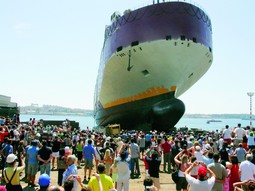Published in Nacional number 710, 2009-06-23
DRAMA surrounding shipyard privatisation
Search for Croatian owners for Uljanik shipyard begins
THE MANAGEMENT OF CROATIA'S MOST SUCCESSFUL shipyard is dissatisfied with the EU conditions for the formation of a consortium of domestic companies to become the new owner of Uljanik, as they will be required to collect a minimum of HRK 400 million, 240 million more than originally planned
 THE MANAGEMENT OF CROATIA'S MOST SUCCESSFUL shipyard is dissatisfied with the EU conditions for the formation of a consortium of domestic companies to become the new owner of Uljanik, as they will be required to collect a minimum of HRK 400 million, 240 million more than originally plannedThe key people running Pula's Uljanik shipyard, in cooperation with the political leadership of the City of Pula and Istria County, will soon set off to form a consortium of domestic companies that will become the new owner of Uljanik when the privatisation of Croatia's shipyards begins at the end of this year. This consortium, which is to consist of large Croatian shipping companies and other successful companies in the Istria region, will have to collect a minimum of HRK 400 million in order to prevent Uljanik from passing into foreign hands. This action is a result of the agreement on the privatisation model for the domestic shipbuilding industry that was agreed to in Brussels by Croatian Deputy Premier Damir Polancec and European Commissioner for Competition Neelie Kroes.
THE MANAGEMENT OF CROATIA'S MOST SUCCESSFUL shipyard is dissatisfied with the EU conditions for the formation of a consortium of domestic companies to become the new owner of Uljanik, as they will be required to collect a minimum of HRK 400 million, 240 million more than originally plannedThe key people running Pula's Uljanik shipyard, in cooperation with the political leadership of the City of Pula and Istria County, will soon set off to form a consortium of domestic companies that will become the new owner of Uljanik when the privatisation of Croatia's shipyards begins at the end of this year. This consortium, which is to consist of large Croatian shipping companies and other successful companies in the Istria region, will have to collect a minimum of HRK 400 million in order to prevent Uljanik from passing into foreign hands. This action is a result of the agreement on the privatisation model for the domestic shipbuilding industry that was agreed to in Brussels by Croatian Deputy Premier Damir Polancec and European Commissioner for Competition Neelie Kroes.
Based on this agreement, the state will sell 25% of its stake in Uljanik to workers of the shipyard under favourable terms, while it will sell the remaining 59.25% to the best bidder. The starting price for Uljanik, unlike the remaining Croatian shipyards, will be based on a nominal company share price of HRK 300. Simply put, this means that the new owner will have to pay at least HRK 397 million for a controlling stake in the company. Polancec has called this agreement a success, claiming that this will secure the continuation of the shipbuilding industry in Pula. This conclusion is true in part for, unlike the remaining shipyards that will be sold at a price of one kuna, the high asking price of Uljanik will disqualify any investors not interested in continuing the core activity of the company, and who are only out to obtain the assets and land of the company. But on the other hand, the Uljanik management are quite dissatisfied with the deal that Polancec struck, claiming that it will now be very difficult to fulfil their objective: to keep the shipyard under domestic ownership.
 COUNTY PREFECT IVAN JAKOVIC Istria County will be one of the shareholders in UljanikThe key people at Uljanik have publicly criticised the idea of privatising the shipyards many times. Their position, which is also supported by some experts and the unions, is that Uljanik should not be equated with the remaining Croatian shipyards, as it is the only one to operate with a profit, and thus should be permitted to remain under state ownership. However, when it became obvious that Polancec was not able to push this through with the European Commission, Uljanik came up with its own concept of privatisation. In this concept, the state would offer 25% of its shares in Uljanik to the workers, another 25% to a strategic partner, and place the rest on the stock market. A domestic consortium would be formed to take over the stake intended for the strategic partner, and thus with the workers would be able to retain the majority stake in the company. Under this model of privatisation, the Croatian partners would need to collect about HRK 160m, unlike the HRK 400m that they will need based on the Polancec-Kroes agreement. If one also considers Polancec's statement that the tender should be released as soon as possible, and the fact that the domestic financial market is fairly insolvent at the current time and companies are facing the recession, it becomes clear that Uljanik has reason for concern. Company officials have avoided the media in recent days, claiming they have not yet been acquainted with the agreement. The unofficial word is that the members of the board of Uljanik are more that just a little concerned.
COUNTY PREFECT IVAN JAKOVIC Istria County will be one of the shareholders in UljanikThe key people at Uljanik have publicly criticised the idea of privatising the shipyards many times. Their position, which is also supported by some experts and the unions, is that Uljanik should not be equated with the remaining Croatian shipyards, as it is the only one to operate with a profit, and thus should be permitted to remain under state ownership. However, when it became obvious that Polancec was not able to push this through with the European Commission, Uljanik came up with its own concept of privatisation. In this concept, the state would offer 25% of its shares in Uljanik to the workers, another 25% to a strategic partner, and place the rest on the stock market. A domestic consortium would be formed to take over the stake intended for the strategic partner, and thus with the workers would be able to retain the majority stake in the company. Under this model of privatisation, the Croatian partners would need to collect about HRK 160m, unlike the HRK 400m that they will need based on the Polancec-Kroes agreement. If one also considers Polancec's statement that the tender should be released as soon as possible, and the fact that the domestic financial market is fairly insolvent at the current time and companies are facing the recession, it becomes clear that Uljanik has reason for concern. Company officials have avoided the media in recent days, claiming they have not yet been acquainted with the agreement. The unofficial word is that the members of the board of Uljanik are more that just a little concerned.
 NEELIE KROES European Commissioner for Competition has requested that the Uljanik starting price be based on a nominal share price of HRK 300This is no surprise, as the domestic consortium for the purchase of Uljanik was supposed to be made up of domestic shipping companies: Uljanik Plovidba, Tankerska Plovidba from Zadar and Atlanska Plovidba from Dubrovnik. Even though these companies in the past have denied speculations that they plan to enter into the ownership structure of Uljanik, claiming that they plan to concentrate on the development of their core activities, such a plan would be more than logical. In recent years, the Croatian shipping companies have achieved great profits, and it could be expected that they would invest a part of those profits into the purchase of a profitable shipyard like Uljanik. But the situation today is somewhat different. The global economic recession has caused a massive drop in shipping transport, and with that carriage revenues have dropped for Croatian companies. In the first quarter of this year, all three large domestic shipping companies had a drop in profits over the same period the year earlier: Uljanik Plovidba was down 40.3%, Tankerska Plovidba down 53% and Atlanska Plovidba down 65%.
NEELIE KROES European Commissioner for Competition has requested that the Uljanik starting price be based on a nominal share price of HRK 300This is no surprise, as the domestic consortium for the purchase of Uljanik was supposed to be made up of domestic shipping companies: Uljanik Plovidba, Tankerska Plovidba from Zadar and Atlanska Plovidba from Dubrovnik. Even though these companies in the past have denied speculations that they plan to enter into the ownership structure of Uljanik, claiming that they plan to concentrate on the development of their core activities, such a plan would be more than logical. In recent years, the Croatian shipping companies have achieved great profits, and it could be expected that they would invest a part of those profits into the purchase of a profitable shipyard like Uljanik. But the situation today is somewhat different. The global economic recession has caused a massive drop in shipping transport, and with that carriage revenues have dropped for Croatian companies. In the first quarter of this year, all three large domestic shipping companies had a drop in profits over the same period the year earlier: Uljanik Plovidba was down 40.3%, Tankerska Plovidba down 53% and Atlanska Plovidba down 65%.
Given the assumption that their operations will be even worse in the second half of the year, it is not difficult to assume that their interest and ability to invest in Uljanik will be markedly reduced. In such a situation, the key people at Uljanik would be most suited to putting off the privatization of the shipyard until after the end of the recession, for times of new economic growth. But with Polancec's new deal, this will not happen, and under these recession conditions, the Croatian companies will be forced to collect HRK 240m more than originally planned. Therefore, it is clear that the ability for the Croatian consortium to compete in the sale of Uljanik will mostly depend on the mood of the financial institutions, and the readiness of the domestic banks to back the deal.
In that context, support of the Croatian political leadership will also be important, and there should be no doubt that the shipyard managers, City of Pula and Istria County will all begin to intensively lobby. Without bank backing, the Croatian companies will certainly not be able to bid against any of the wealthy, foreign bidders. Currently, it is not known which companies could put forth their bid, though some potential companies mentioned often are the Italian Ansaldo shipyard from Genova and Fincantieri from Monfalcone.
 DAMIR POLANCEC Deputy Premier and Minister of the Economy, Labour and Entrepreneurship made an agreement with Neelie Kroes on the privatisation model for the Uljanik shipyard that the shipyard management is not satisfied withNot so long ago, Fincantieri was fingered as a possible buyer for Uljanik's factory for electrical machines and devices. Given the fact that this shipyard building concern is owned by the Italian state-held company Finetecna, domestic unions have often pointed it out as an example of how the shipyard need not be privatised through privatisation. However, the announcement of Fincantieri's privatisation was made at the end of last year, but the entire deal was postponed due to the exceptionally poor state of the world financial markets.
DAMIR POLANCEC Deputy Premier and Minister of the Economy, Labour and Entrepreneurship made an agreement with Neelie Kroes on the privatisation model for the Uljanik shipyard that the shipyard management is not satisfied withNot so long ago, Fincantieri was fingered as a possible buyer for Uljanik's factory for electrical machines and devices. Given the fact that this shipyard building concern is owned by the Italian state-held company Finetecna, domestic unions have often pointed it out as an example of how the shipyard need not be privatised through privatisation. However, the announcement of Fincantieri's privatisation was made at the end of last year, but the entire deal was postponed due to the exceptionally poor state of the world financial markets.
In the meantime, the concern experienced losses due to a reduction in orders, and began with layoffs. CEO Giuseppe Bono announced that Fincantieri may soon have to close the doors on some of its less competitive shipyards. In that context, it becomes questionable as to whether the Italian company would even be interested in buying Uljanik at the current time. On the other hand, a price of HRK 400m for 59.25% of the ownership of Uljanik could be considered a very reasonable price. Last year, the Pula shipyard achieved profits of HRK 45.18m, and had profits of HRK 10m in the first quarter of this year, despite the difficult market conditions. Its planned revenues for 2009 are EUR 470m.
 PULA MAYOR The political leadership of the City of Pula, led by Mayor Boris Miletic, plans to work together with the Uljanik management and Istria County to form a consortium of Croatian companies to buy out UljanikFurthermore, the company has contracts valued at more than EUR 1.3bn. Considering the fact that Uljanik has long been entering in contractual clauses where the client covers the possible price changes due to currency fluctuations, it is certain that the company will achieve a profit on these deals. Also, it is important to note that this year, the shipyard will deliver its first dredging ship. This is a very sophisticated, technologically advanced and expensive vessel, intended for underwater dredging and excavation works. These boats are considered products with high added value, meaning that the shipyards building them earn much more per ship than on simple vessels such as oil tankers. For this reason, Uljanik is convinced that through the development of the production process for such vessels, that it can ensure long-term employment and profitability. This, together with the fact that Uljanik is the only Croatian shipyard to not rely on state guarantees, but instead builds it ships using commercial loans, it is a logical assumption that investing in the shipyard could prove to be very profitable in the long-term.
PULA MAYOR The political leadership of the City of Pula, led by Mayor Boris Miletic, plans to work together with the Uljanik management and Istria County to form a consortium of Croatian companies to buy out UljanikFurthermore, the company has contracts valued at more than EUR 1.3bn. Considering the fact that Uljanik has long been entering in contractual clauses where the client covers the possible price changes due to currency fluctuations, it is certain that the company will achieve a profit on these deals. Also, it is important to note that this year, the shipyard will deliver its first dredging ship. This is a very sophisticated, technologically advanced and expensive vessel, intended for underwater dredging and excavation works. These boats are considered products with high added value, meaning that the shipyards building them earn much more per ship than on simple vessels such as oil tankers. For this reason, Uljanik is convinced that through the development of the production process for such vessels, that it can ensure long-term employment and profitability. This, together with the fact that Uljanik is the only Croatian shipyard to not rely on state guarantees, but instead builds it ships using commercial loans, it is a logical assumption that investing in the shipyard could prove to be very profitable in the long-term.
But whether the key people in Uljanik will succeed in their intent to keep their company under domestic ownership will depend on their ability to find adequate partners. Tying together the ownership of shipyards and shipping companies in Croatia has already proven to be a good solution in the case of Viktor Lenac, which is co-owned by Tankerska Plovidba. However, whether or not the domestic shipping companies can and will enter into a competition with wealthy foreigners is still very uncertain at the present time.
Future ownership structure
If the plans of the Uljanik management are fulfilled, the majority share of 59.25% should be taken over by a consortium of successful Croatian companies. But in order to do so, they will need a minimum of HRK 400m. Under the current recession conditions, it is questionable whether or not the Croatian companies will be able to collect enough money to compete with wealthy, foreign companies.
Related articles
Jakovcic and Haider's Istrian connection
Austrian investigators are increasingly focusing their efforts on projects that the Hypo Alpe Adria Group backed financially in Istria County,… Više
Latest news
-
28.10.2010. / 14:15
'A profitable INA is in everyone's interest'
-
28.10.2010. / 09:38
Sanader’s eight fear SDP — Won’t bring down Government
-
21.10.2010. / 15:02
Interior Ministry turned a blind eye on Pukanic assassination
-
20.10.2010. / 09:34
Barisic could bankrupt HDZ




